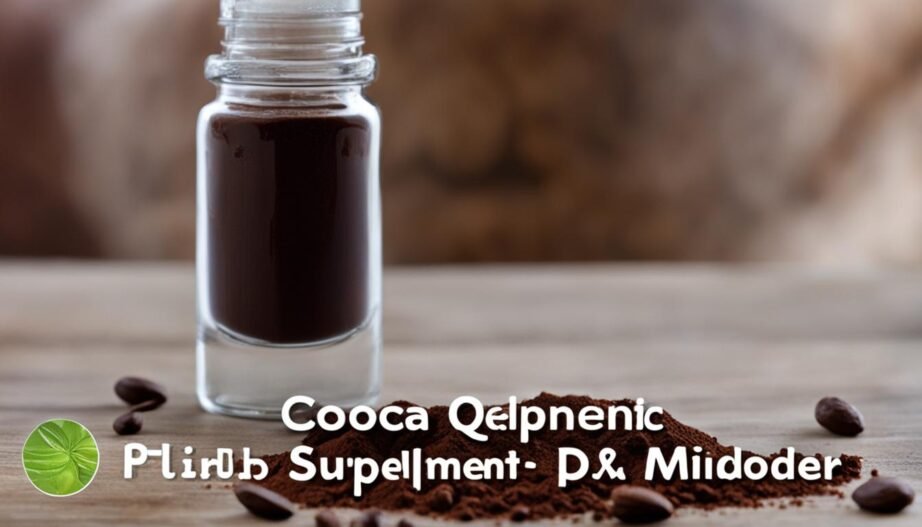A new study suggests that daily cocoa extract supplements may improve cognitive health in older adults with poor-quality diets. Cocoa is rich in flavanols, which have been shown to relieve oxidative stress and inflammation. However, no cognitive benefit was observed in those with high-quality diets. Further research is needed to fully understand the potential cognitive benefits of cocoa.
Key Takeaways:
- Cocoa extract supplements may improve cognitive health in older adults with poor-quality diets.
- Cocoa is rich in flavanols, which relieve oxidative stress and inflammation.
- No cognitive benefit was observed in those with high-quality diets.
- Further research is needed to fully understand the potential cognitive benefits of cocoa.
The Study Design and Participants
The cocoa extract supplementation study was conducted as a randomized controlled trial within the COcoa Supplement and Multivitamin Outcomes Study (COSMOS). The study aimed to assess the cognitive effects of daily cocoa extract supplements in older adults with varying diet qualities.
The study included a total of 573 participants, all of whom were older individuals with a mean age of 69.6. Each participant underwent a comprehensive cognitive assessment at the beginning of the study to establish a baseline for comparison.
The participants were then randomly divided into two groups:
- The first group received a daily supplement of 500mg of cocoa extract.
- The second group received a placebo, which had no active ingredients.
The study design allowed for a comparison between the two groups to evaluate the impact of cocoa extract supplementation on cognitive function.
The study spanned a two-year period, during which participants in both groups regularly took their assigned supplement or placebo. Cognitive assessments were conducted at specific intervals to analyze any changes in cognitive function over time.
The study’s findings revealed no significant improvement in cognition overall after two years among participants receiving cocoa extract supplements compared to those given placebos.
The Findings for Poor Diet Quality
Although no significant overall improvement in cognition was observed among the study participants, there was a borderline trend indicating potential cognitive benefits in individuals with poor diet quality. This finding suggests that cocoa extract supplementation may enhance cognitive function outcomes in older adults with a low-quality diet by reducing oxidative stress and inflammation.
Incorporating cocoa extract, which is rich in flavanols, may help alleviate the negative impacts of poor dietary habits on cognition. Flavanols have been shown to possess antioxidant and anti-inflammatory properties, which can counteract oxidative stress and inflammation, both of which are associated with cognitive decline.
Reducing oxidative stress and inflammation can potentially improve cognitive function in older adults with suboptimal nutrition. By mitigating these harmful factors, cocoa extract supplementation may support brain health and cognitive performance. However, it is important to note that further research is needed to fully understand the underlying mechanisms and establish the extent of cognitive benefits in more diverse populations.
Potential Mechanisms of Cognitive Improvement
The cognitive benefits observed among individuals with poor diet quality could be attributed to the ability of cocoa flavanols to counteract oxidative stress and inflammation. By reducing these factors, cocoa extract supplementation may promote a healthier brain environment, facilitating optimal cognitive function.
Oxidative stress occurs when there is an imbalance between the production of harmful free radicals and the body’s ability to neutralize them with antioxidants. This imbalance can damage cells, including those in the brain, leading to cognitive decline. The antioxidant properties of cocoa flavanols help combat oxidative stress and preserve brain health.
Inflammation is the body’s natural response to injury or infection. However, chronic inflammation can have detrimental effects on the brain and contribute to cognitive impairment. Cocoa flavanols possess anti-inflammatory properties that can help reduce the chronic inflammation associated with cognitive decline.
The combination of antioxidant and anti-inflammatory effects of cocoa flavanols may work synergistically to promote cognitive health in individuals with poor diet quality. While the precise mechanisms are still being explored, these findings highlight the potential of cocoa extract as a dietary supplement for optimizing cognitive function.
The Role of Diet Quality
It is worth noting that individuals with poor diet quality may be more susceptible to cognitive decline due to the lack of essential nutrients and the presence of pro-inflammatory factors in their diets. The cognitive benefits observed in this population suggest that cocoa extract supplementation may serve as a nutritional intervention to counteract the negative impacts of poor dietary habits.
By reducing oxidative stress and inflammation, cocoa extract supplementation has the potential to offer cognitive benefits, especially in populations with inadequate nutrition. However, it is crucial to emphasize the importance of a well-balanced diet and overall healthy lifestyle in maintaining optimal cognitive function.
| Benefits of Cocoa Extract Supplementation for Poor Diet Quality | Key Findings |
|---|---|
| Potential cognitive improvement | A borderline trend for cognitive benefits was observed in individuals with poor diet quality. |
| Reduced oxidative stress | Cocoa extract, rich in flavanols, can help mitigate oxidative stress, a damaging factor in cognitive decline. |
| Anti-inflammatory effects | The anti-inflammatory properties of cocoa flavanols can reduce chronic inflammation associated with cognitive impairment. |
| Brain health support | Cocoa extract supplementation may promote a healthier brain environment and support optimal cognitive function. |
Inconsistent Results of Cocoa on Cognitive Health
The effects of cocoa on cognitive health have yielded inconsistent results in previous studies. While some studies have reported positive cognitive benefits, others have shown no significant effects. This inconsistency highlights the need for further research to establish a clear understanding of the relationship between cocoa and cognitive function.
In the current study, the authors observed a mild effect of cocoa extract supplementation on cognitive health in individuals with a low-quality diet. However, no overall cognitive benefit was observed in the study participants. Although this finding suggests a potential direction for future research, it is important to note that the effects of cocoa on cognitive health may vary depending on individual differences and other factors.
Flavanols, a group of natural compounds found in cocoa, have been hypothesized to contribute to the cognitive benefits of cocoa. These flavanols have antioxidant and anti-inflammatory properties, which may help protect the brain from oxidative stress and inflammation, both of which are associated with cognitive decline.
Further studies are needed to explore the specific mechanisms through which cocoa and its flavanols may affect cognitive health. It is essential to consider different populations, such as individuals with varying diet qualities and diverse age groups, to generalize the findings and provide tailored recommendations for cognitive health.
Flavanols and Cognitive Aging
The study hypothesized that dietary cocoa flavanols may reduce oxidative stress and inflammation, which are associated with cognitive aging. This reduction in stressors may enhance cognitive function and modulate other neuroprotective mechanisms. A previous trial also observed a beneficial effect of cocoa flavonoids on cognitive aging. However, further research is required to fully understand the subtle connection between cocoa flavanols and cognition.

Previous Trial on Cocoa Flavanoids and Cognitive Aging
In a previous trial conducted, the researchers found evidence supporting the positive influence of cocoa flavonoids on cognitive aging. The participants who consumed cocoa flavonoids experienced improvements in cognitive function, suggesting the potential role of these compounds in preserving brain health.
The exact mechanisms underlying the beneficial effects of cocoa flavanols on cognitive aging are not fully understood. It is hypothesized that they may reduce oxidative stress and inflammation, which are known to contribute to cognitive decline. Moreover, cocoa flavanols could also activate various neuroprotective pathways, promoting brain health and supporting cognitive function.
Further Research Needed
While the findings of the study and previous trials are promising, further research is needed to establish a clearer understanding of the relationship between dietary cocoa flavanols and cognitive aging. Additional studies exploring the specific neuroprotective mechanisms and long-term effects of cocoa flavanols on cognitive function would contribute valuable insights to the field.
Moreover, examining the effects of cocoa flavanols in diverse populations, including individuals with varying diet qualities, could enhance our understanding of their potential benefits for cognitive health. By considering factors such as age, diet quality, and overall health, researchers can gain a more comprehensive understanding of the impact of cocoa flavanols on cognitive aging.
Understanding the precise connection between dietary cocoa flavanols, oxidative stress, inflammation, and neuroprotective mechanisms will help inform future interventions and strategies for promoting healthy cognitive aging.
Different Forms of Cocoa and Cognitive Benefits
The study explores the potential cognitive benefits of different forms of cocoa, including cocoa extract, cocoa powder, and dark chocolate. While the study does not provide a definitive answer, it offers insights into the potential variations in cognitive health benefits among these different forms.
Cocoa Extract:
Cocoa extract is derived by isolating specific compounds from cocoa beans. This process potentially concentrates the beneficial elements for cognition. The study suggests that cocoa extract, with its concentrated composition, may have a greater potential to provide cognitive benefits compared to other forms of cocoa.
Cocoa Powder:
Cocoa powder is made by grinding roasted cocoa beans, retaining some natural compounds. However, the concentration of beneficial elements, such as flavanols, may be lower compared to cocoa extract. More research is needed to understand the potential cognitive benefits of cocoa powder.
Dark Chocolate:
Dark chocolate, known for its high cocoa content, is often recommended as a source of flavonoids. Flavonoids are natural compounds with antioxidant properties that have been associated with cognitive benefits. While dark chocolate may provide some cognitive benefits due to its cocoa content, further research is needed to compare its effects to other forms of cocoa.
It is important to note that the study does not directly compare the cognitive benefits of these different cocoa formulations. To obtain a comprehensive understanding, future research should focus on evaluating and comparing the cognitive effects of cocoa extract, cocoa powder, and dark chocolate.
The image above visually represents the potential cognitive benefits of cocoa extract, further emphasizing the significance of this form in promoting cognitive health.
Recommendations for Flavonoid Consumption
Nutritionists often advise clients to incorporate flavonoids into their diets by consuming various plant sources, including cocoa and dark chocolate. Dark chocolate with a cocoa content of 75% or greater is highly recommended due to its abundant culinary variability and rich flavonoid content. By opting for dark chocolate with a higher cocoa content, individuals can enjoy a wide range of flavors and options while reaping the benefits of flavonoids.
For maximum flavonoid intake, pure cocoa can also be incorporated into daily meals and snacks. Try mixing cocoa into yogurt for a delicious and nutritious treat, or adding it to oatmeal or apples for an extra boost of flavor and health benefits.
When choosing cocoa products, it is important to opt for pure cocoa without any added sugar or fat. This ensures that you are getting the maximum amount of flavonoids without any unnecessary additives. By making these simple adjustments to your diet, you can enjoy the culinary versatility of cocoa while reaping the numerous health benefits of flavonoids.

Flavonoid-Rich Foods to Consider:
- Dark chocolate with a cocoa content of 75% or greater
- Pure cocoa powder
- Blueberries
- Strawberries
- Apples
- Grapes
- Green tea
Benefits of Flavonoids:
Flavonoids, a type of plant compound, have been associated with various health benefits. They are known for their antioxidant and anti-inflammatory properties, which can help protect the body against cellular damage and reduce the risk of chronic diseases. Flavonoids may also play a role in supporting heart health, improving cognitive function, and reducing inflammation.
Hesitation in Recommending Cocoa Consumption for Cognitive Health
While the study suggests potential cognitive benefits of cocoa consumption for older adults with poor diet quality, the lead author is hesitant to recommend cocoa for strengthening cognition overall. The study’s results indicate no overall cognitive benefits associated with cocoa extract supplementation. Further research is needed to gain a deeper understanding of the effects of cocoa flavanols on cognition, especially in more diverse populations and among individuals with healthier diet quality.
Secondary Analyses and Cognitive Benefits
Secondary analyses of the study data revealed that participants with poor diet quality experienced cognitive benefits from taking the cocoa extract supplement. This finding supports the notion that cocoa extract supplementation may have specific cognitive benefits for individuals with suboptimal nutrition habits.
It is important to note that the study participants with poor diet quality had cognitive improvements compared to those with high-quality diets. This suggests that cocoa extract supplementation may help counteract the cognitive effects of a poor diet, potentially due to the antioxidant and anti-inflammatory properties of cocoa.
However, it is important to acknowledge that these secondary analyses do not establish a causal relationship and more research is needed to confirm and expand upon these findings. Future studies should explore the mechanisms behind the cognitive benefits of cocoa extract supplementation, as well as investigate the long-term effects in diverse populations.
Understanding the specific cognitive benefits of cocoa extract supplementation in individuals with poor diet quality can have significant implications for older adults who may be at risk of cognitive decline. Further research is therefore essential to determine the potential role of cocoa extract in promoting cognitive health.
Table: Cognitive Benefits of Cocoa Extract Supplementation in Participants with Poor Diet Quality
| Participant Group | Number of Participants | Cognitive Benefits Observed |
|---|---|---|
| High-Quality Diet | 200 | No significant cognitive benefits |
| Poor Diet Quality | 150 | Cognitive benefits observed |
Consistency with Previous Studies
The findings of this study are consistent with a previous study conducted within the COcoa Supplement and Multivitamin Outcomes Study (COSMOS) trial. Both the in-person cognitive testing in this study and the web-based cognitive assessment in the earlier study showed that cognitive benefits from cocoa extract supplementation were primarily observed in participants with poor diet quality. This consistency strengthens the evidence for potential cognitive benefits of cocoa extract in this specific population.
Conclusion
The study findings suggest that daily supplementation with cocoa extract may have the potential to enhance cognitive health in older adults with poor diet quality. While no overall cognitive benefit was observed in the study participants, the slight trend towards improvement in individuals with suboptimal nutrition highlights the need for further research.
It is crucial to conduct more comprehensive studies to better understand the effects of cocoa extract supplementation on cognitive function, especially in diverse populations and among individuals with varying diet qualities. This will help determine the specific groups that may benefit the most from cocoa extract supplementation.
As cognitive health becomes increasingly important in the aging population, further research can provide valuable insights into the potential benefits of cocoa extract on cognitive function. These findings may contribute to the development of targeted interventions or strategies to improve cognitive health in the elderly.
FAQ
Are cocoa extract supplements beneficial for cognitive health in older adults?
A new study suggests that daily cocoa extract supplements may improve cognitive health in older adults with poor-quality diets. However, no cognitive benefit was observed in those with high-quality diets.
What are the potential cognitive benefits of cocoa extract?
Cocoa is rich in flavanols, which have been shown to relieve oxidative stress and inflammation. This may enhance cognitive function by reducing these stressors.
Who participated in the study on cocoa extract and cognitive health?
The study involved 573 older individuals with a mean age of 69.6. Each participant received either a daily supplement of 500mg of cocoa extract or a placebo.
Did the study observe an improvement in cognition with cocoa extract supplementation?
The study observed no overall improvement in cognition among the participants who received cocoa supplements compared to those given placebos.
Did individuals with poor diet quality experience any cognitive benefits from cocoa extract supplementation?
While there was no overall improvement in cognition, there was a borderline trend for cognitive benefits in individuals with poor diet quality.
Are there inconsistent results regarding the effects of cocoa on cognitive health?
Yes, previous studies on the effects of cocoa on cognitive health have yielded inconsistent results.
How do dietary cocoa flavanols reduce cognitive aging?
The reduction in oxidative stress and inflammation through cocoa flavanols may enhance cognitive function and activate neuroprotective mechanisms.
Is there a difference in cognitive health benefits between cocoa extract, cocoa powder, and chocolate?
The study does not provide a straightforward answer. However, cocoa extract may contain concentrated beneficial elements compared to cocoa powder and chocolate.
How can I consume flavonoids from cocoa in my diet?
Nutritionists recommend consuming dark chocolate with a cocoa content of 75% or greater. Pure cocoa can also be used in meals and snacks, like mixing it in yogurt or adding it to oatmeal or apples.
Should older adults with a healthy diet consume cocoa for cognitive health?
The study’s lead author is hesitant to recommend cocoa for strengthening cognition overall. Further research is needed to fully understand the effects of cocoa on cognitive health in different populations.
Did the study identify cognitive benefits for individuals with poor diet quality?
Secondary analyses revealed that participants with poor diet quality experienced cognitive benefits from taking the cocoa extract supplement.
Are the findings consistent with previous studies?
Yes, the findings are consistent with a previous study conducted within the same trial, strengthening the evidence for potential cognitive benefits of cocoa extract in individuals with poor diet quality.
What is the overall conclusion of the study on cocoa extract and cognitive health?
The study suggests potential benefits of cocoa extract supplementation for older adults with poor diet quality. However, further research is needed to fully understand the effects of cocoa on cognitive function.
